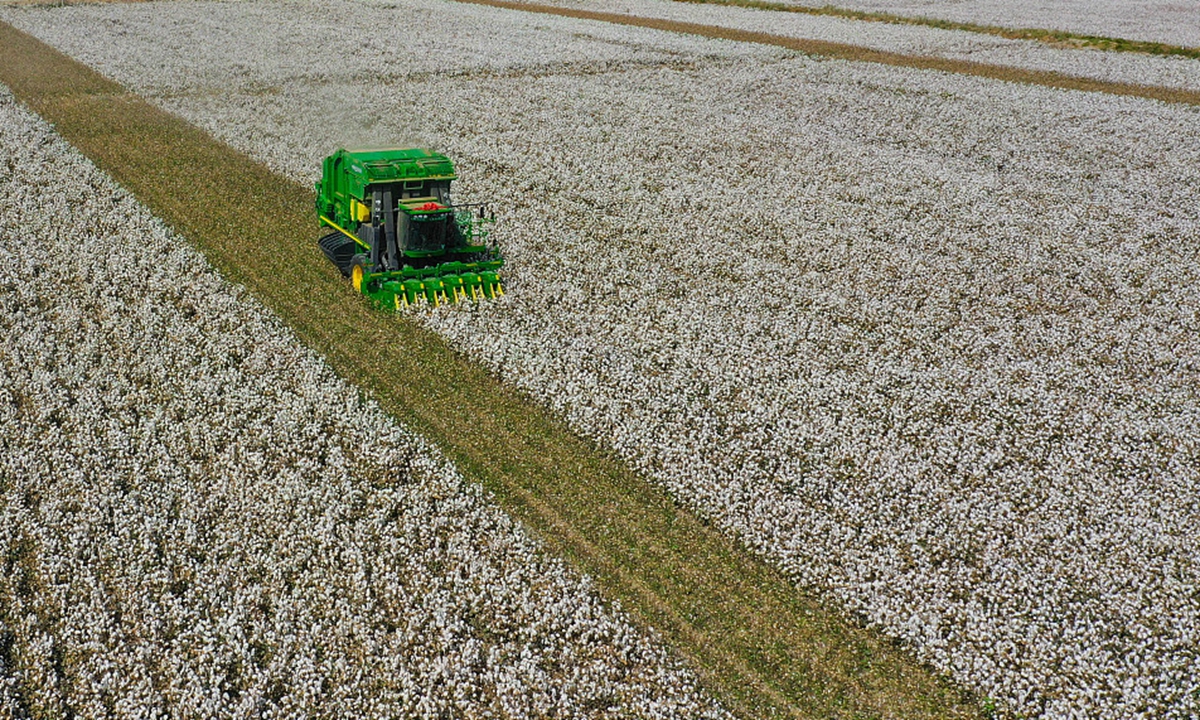US blacklisting of Chinese firms for 'forced labor' based on lies: Foreign Ministry

Xinjiang cotton Photo: VCG
Chinese officials denounced on Wednesday the US move to blacklist Chinese firms over "forced labor" allegations, saying that such claims are based on lies, and lack an actual basis and transparency. It is a typical case of "economic coercion" and is detrimental to international trade rules, they noted.
"The allegation of 'forced labor' in Xinjiang is nothing but an enormous lie propagated by anti-China elements to smear China. It is the very opposite of the fact that the labor rights of people of all ethnic backgrounds in Xinjiang are effectively protected," said a Chinese Foreign Ministry spokesperson on Wednesday.
China will take necessary measures to firmly defend the legitimate interests of Chinese enterprises, a spokesperson of China's Ministry of Commerce (MOFCOM) said on Wednesday.
By fabricating and hyping lies, the US has imposed sanctions on Chinese firms relentlessly. Such a move is a unilateral bullying practice in the name of "human rights," and aims to destroy the stability and prosperity of the Xinjiang region, the MOFCOM spokesperson said.
The remarks came after the US added two China-based companies to a blacklist on Tuesday, barring their goods from entering the US, in a move to protect against the so-called forced labor from supply chains.
Battery maker Camel Group, along with spice and extract company Chenguang Biotech Group, were the latest to be included in the Uyghur Forced Labor Prevention Act (UFLPA) entity list, according to US authorities.
The UFLPA prohibits goods from being imported into the US that are either produced in Xinjiang or by entities on the UFLPA entity list, unless the importer can prove, by clear and convincing evidence, that the goods were not produced using "forced labor."
The UFLPA has been in effect since June 21, 2022 and has been criticized by the global business community for "decoupling" from China and affecting international trade.
The US enforcement of the so-called Uyghur Forced Labor Prevention Act on the basis of such a lie is detrimental to international trade rules and the stability of global industrial and supply chains, the Foreign Ministry spokesperson said.
Two other Chinese companies — printer manufacturer Ninestar Corp and chemical products firm Xinjiang Zhongtai Chemical — were added earlier this year.
The move to blacklist Chinese entities and go after more Chinese companies is aimed at undermining Xinjiang's prosperity and stability and containing China's development, the Foreign Ministry spokesperson noted.
Chinese experts said that the unilateral US sanctions on Chinese companies based on fabricated assertions are against the fundamental principles of international law.
The ultimate goal for the US is to use groundless claims to crack down on Xinjiang's vital industries and contain China's development, Li Yong, a senior research fellow at the China Association of International Trade, told the Global Times on Wednesday.
"The US has primarily imposed sanctions on advanced manufacturing and high-tech industries in Xinjiang region, such as the biotechnology, photovoltaic and battery industries, which is a targeted attack on Chinese companies," Li said.
The Foreign Ministry spokesperson said that China condemns and rejects this act and will take strong measures to firmly safeguard Chinese companies' lawful rights and interests.
Global Times

